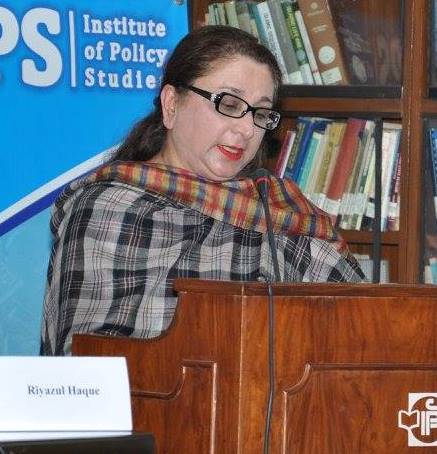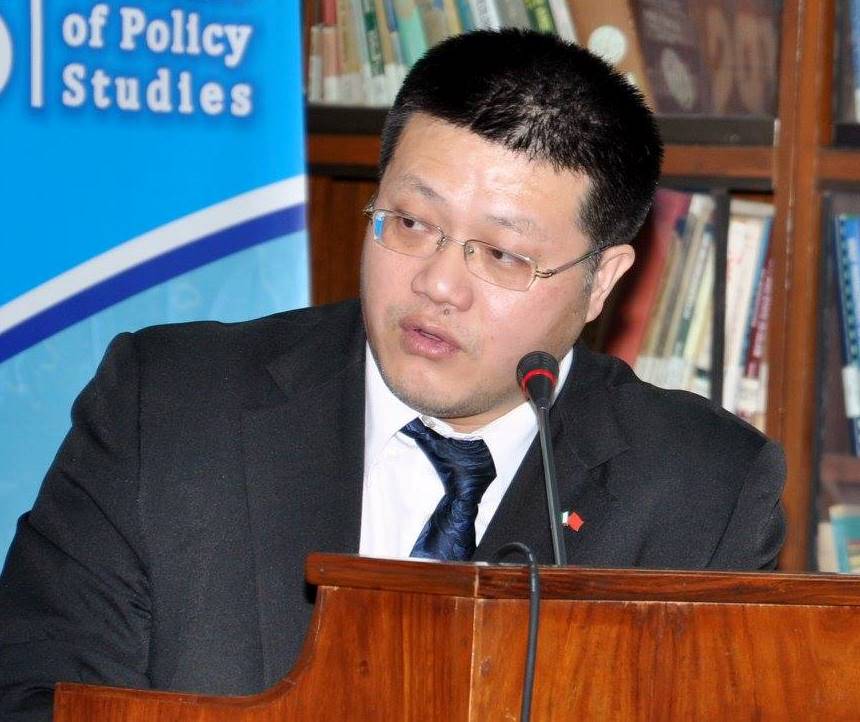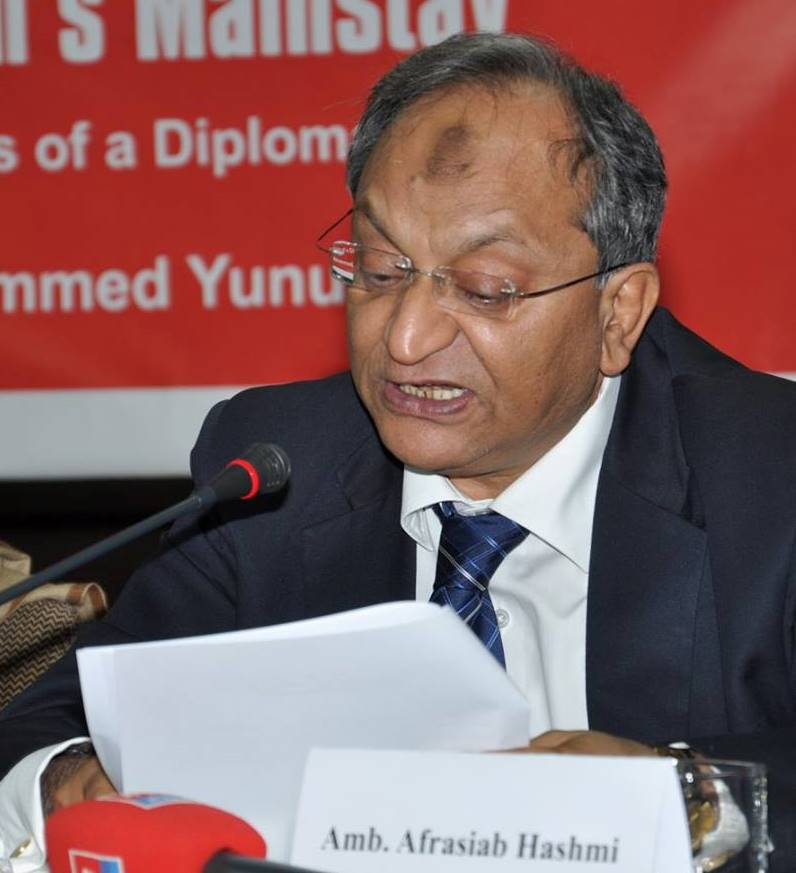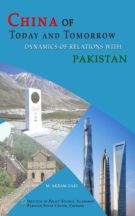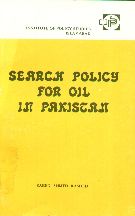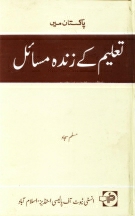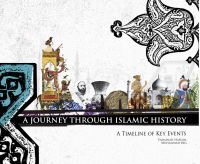Barrister Saadia Abbasi’s speech on the book launch
Following is the text of speech made by Barrister Saadia Abbasi, former senator and member IPS – National Academic Council, on the occassion of Ambassador (r) Muhammad Yunus’s book launching ceremony held at IPS on November 26, 2014.
Following is the text of speech made by Barrister Saadia Abbasi, former senator and member IPS – National Academic Council, on the occassion of Ambassador (r) Muhammad Yunus’s book launching ceremony held at IPS on November 26, 2014.
At the outset I would like to thank Dr. Khalid Rahman for extending the invitation to me to speak about Ambassador Mohammed Yunus’s book. It is an honor and privilege for which I am gratified.
I would like to welcome the chief guest, Mr. Yao Wen, who is representing the Embassy of China here today.
I would also like to welcome the session chair, Ambassador and Secretary General Akram Zaki, Ambassador Afrasayab Hashmi from the Ministry of Foreign Affairs, Pakistan, Mr. Riyaz ul Haq who is a member of the Institute of Policy Studies (IPS) and is on the National Academic Council, and the other distinguished participants of today’s event.
Finally, I would like to extend a very warm welcome to Ambassador Mohammed Yunus. His book, ‘Awakened China Shakes the World and is Now Pakistan’s Mainstay’, is the reason for all of us being present here today.
I see myself as an ‘interested’ (or curious) observer of policy matters in general and foreign affairs in particular, as there are other pursuits that I have to deal with. Moreover, if there is no role or contribution then it is prudent to be an ‘observer’. However, I am glad that Dr. Rahman asked me to review Ambassador Yunus’s very enlightening record and window into the evolution of the new state of Pakistan’s time-honored and time-tested relationship with China, how it was built-up, and the manner in which it has been sustained since then.
Ambassador Yunus touches on the milestones in the historical development of this relationship and the role of those individuals who shaped and nurtured it. He does great justice to these people, both in China and in Pakistan, and each person’s role is given due credit. Those who are students of history and foreign policy will appreciate that if a building block is solid then the structure will survive.
There are a number of events in this book that I would have referred to but due to time constraints I would like to direct your attention to one or two, as an illustration of the great respect and honor that the Chinese people always expressed towards the people of Pakistan. In this regard I will refer to page(s) 97-98 of the book for reading – the paragraph titled “Bhutto’s Surprise” is worth examining as it is highly inspiring and motivational. This is more so for the younger generation of Pakistan as it is a view into a world that has been overtaken by sound-bites on television and newspaper headlines which cannot reflect the essence of the hard work put in by our foreign-service officers in showing the best face of our country to the world. Where the skeptic will argue that it is their job, my answer would be that if a job is done with excellence and commitment then it is more than a job and is a life.
The book also explains the painstaking efforts that our diplomats and policy-makers took in maneuvering Pakistan’s relationship with China in periods of evolving international relations and great power rivalries, serious issues of war and conflicts that Pakistan faced, political crisis in Pakistan and resultant impact on policy matters, settling of ‘demarcation of boundary issues’ with both Iran and China, building up of Pakistan’s armed forces armaments, and the financial assistance given to our country in times of extreme hardship (in this regard the narration of events at page 118 is an eye-opener), the establishment of the air-link with China, the role of Pakistan in facilitating Mr. Kissinger’s historic visit to China, to name just a few. In my view there are important lessons to be learnt from the narration of these events. Ambassador Yunus is not just a diplomat but he is an academician, and he has put his account of events in the historical perspective as well as in the context of evolving world politics and Pakistan’s existing political developments.
While this book may be read as a personal account of a diplomat, in my view it is an insight into the development of modern China’s political, social, and economic systems – from revolution to pragmatism to super-power status. It also narrates the building of Pakistan-China relations and friendship through these events and developments in China, and how the ties gained momentum, and went from strength to strength. The book also highlights the manner in which Pakistan straddled its ‘west-oriented’ policies on one side yet drew closer to the then communist world by opening up, and developing relations, with China. It must be read and analyzed as a chronicle to guide students of history and international relations for further study. There are innumerable topics in the book which can spawn further research on related topics.
Ambassador Yunus has had a rich and varied life and he has touched on some aspects of it in the book. In this regard his personal experiences with the Bank of Credit & Commerce Int., and the Gokal Group is yet another window into a world, or facts, that most people in Pakistan have either forgotten or are not aware of. It is not possible to go into the role of Mr. Agha Hasan Abedi and the Gokals in shaping Pakistan’s commerce and industry in this sitting but Ambassador Yunus leads us into that, and compels us to ponder over it. These individuals attained, without any doubt, world-class status and put Pakistan on the map of international finance and commerce. Their contributions were innumerable and the fall of their institutions is a tragedy for Pakistan. There is so much that can be said on this subject, and to reflect on how we can draw inferences from it. Perhaps Ambassador Yunus can write about it in greater detail for the benefit of historical narrative and analysis. With all our myriad problems Pakistan is a country of great potential and can lift itself from stagnation towards a great and progressive country.
In the end I would like to thank Ambassador Yunus for his deeply insightful and historical narrative of Pakistan’s relations with China. I have been enriched as a result of reading his account of events, and analysis of the ideological underpinnings of China’s leaders through different phases. I am sure this book will generate further interest and commentaries and IPS is to be commended for publishing it.
With these words I thank you all for a patient hearing.


